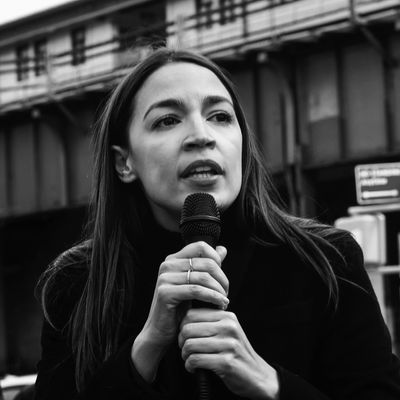
Last Monday, the world watched disturbing footage of Daniel Penny choking Jordan Neely to death on the New York City subway. But after Penny was questioned by police and let go without any charges, the media described the killing with passive headlines (“Man Dies on Subway After Another Rider Places Him in Chokehold,” said the New York Times), and many elected officials failed to forcefully condemn the death. (“There are consequences for behavior,” said Governor Kathy Hochul). Against that backdrop, a decisive voice stood out: “Jordan Neely was murdered,” tweeted Representative Alexandria Ocasio-Cortez.
Not everyone agreed. New York Mayor Eric Adams called her words irresponsible given the ongoing investigation into Neely’s death. “To really interfere with that is not the right thing to do,” he told CNN. “I’m going to be responsible and allow them to do their job and allow them to determine exactly what happened here.” But for Ocasio-Cortez, the situation is not complicated: She says a 30-year-old was killed for the crime of being hungry and unhoused, in a city where he couldn’t access basic support. While Penny put Neely in a deadly chokehold, she thinks Adams’s policies around crime and homelessness helped snuff out his life. “Jordan Neely was killed by public policy,” she told the Cut. “He was killed by the demonizing of the poor by many of our leaders.”
This tragedy took place in the subway, which almost every New Yorker uses. Do you think that’s part of the reason it’s resonated with people so much?
The subway is the ultimate public space. I’ve spent countless hours on the subway. I still take it to this day. It’s a mirror to our society. When our policies drive up homelessness, you will see more homeless people on the subway. When our policies create an unsafe environment, we’re bound to feel less safe on the subway. I myself have felt unsafe on the subway. I have left train cars. I have had men follow me around. But never, ever, ever have I felt a desire to harm that person. Nor have I seen anyone else try to. If something seems especially escalatory, then yeah, you might feel on edge. I think most people avoid eye contact, look down between their shoes, and wait for the moment to pass. Most of the time, it does. If you feel uncomfortable, move. That usually solves the problem.
It’s hard not to wonder if Neely would still be alive had someone offered him a bottle of water.
De-escalation is a skill set. It is something that every single one of us could learn. It is something that could even be a matter of public education and public-health campaigns. Sometimes a person may be at a 10 emotionally, and the smallest gesture of humanity can help them out. I had a situation two weeks ago on the street in D.C. where it seemed like someone was popping off, and I said, “Hey, man, I’m gonna get you some lunch.” Jordan Neely was saying exactly what he needed, which was food. He narrated this tragedy himself. He said, “I’d rather be in jail than try to navigate what the city has become.” Every single one of us is at the brink right now. Rents have skyrocketed to these absolutely extortionate prices. When housing prices go up, homelessness goes up. It’s not a grand mystery. I’ve been just dismayed to see what the response to this has been at the highest levels.
Let’s talk more about that. Last week you called Neely’s death a murder, and you faced some backlash from Mayor Eric Adams, who thought that kind of statement was reckless. What do you say to politicians who share this critique?
I would like everyone to pretend that was their son. I would like anyone to look at that video, see their son, and see if they would say the same thing.
Apart from the fact that no charges have been laid, why do you think politicians have shied away from using such decisive language about what happened? Why is there a reluctance to call this a killing?
I think in order to stand up for Jordan Neely, we’d have to admit that public decisions made by leaders have been failing. You have the victim himself talking about how it would be easier to be incarcerated than to access support in the city. That is the Adams administration’s policy. They are out here asking every single City Council member to strip funding for homelessness services, mental health, schools, pools, parks, and public spaces and to further militarize a police department that just got a $5 billion contract raise. Jordan Neely was killed by public policy. He was killed by the demonizing of the poor by many of our leaders. He was killed by the same reluctance for people to see him as human that leaders are exhibiting right now, even in his death.
A tentpole of Adams’s agenda is being tough on crime, particularly in response to the rise in deadly subway attacks. In a statement, he also said, “Our administration has made record investments in providing care to those who need it and getting people of [sic] the streets and the subways, and out of dangerous situations.” You called his words a “new low.” Why?
In the initial statements that we’ve seen, there hasn’t even been a full-throated effort to offer condolences for this tragedy. It was almost as though the actual killing that we saw was the asterisk and a defense of what happened was centered. The last sentence of Adams’ statement was about this desire to support mental-health and housing resources. This administration is doing exactly the opposite of that. When are we going to stop pretending? We need to make these investments and not as a gesture, not as a talking point. A safer city is one with fewer homeless people, not because they’ve been displaced but because they have been housed.
Most of the city’s attempts to make the New York subways safer, like more police or forcibly detaining those with mental-health issues, paint the Neelys of the world as a threat. Many have pointed out his criminal history as proof he was violent. But what’s more unsafe than being starving in a city where you have nowhere to live?
There is nothing, nothing, nothing that can justify killing a person, especially if they are unarmed and not a physical threat to anyone. There’s a hypocrisy to the way many officials talk about public safety. All of these responses are acting as though Neely was the aggressor here, when he was the one who was murdered. There’s all this talk about making our public spaces safer, and a person literally killed another human being on the subway. When you create a situation where harming a certain class of people may be excused, then we incentivize this kind of behavior. Anybody can point to anybody else and say, “Oh, well, I was scared of them.”
All of this has to do with race and class. If the city just wants this to be a playground for the rich, that is the most dangerous outcome for all of us. We are all subject to violence if the value of our life is measured by our income, or measured by our mental health, or measured by our race. Most of us are closer to Neely than we are to a billionaire.
People who witnessed Neely’s death have said the tragedy could have been avoided had the police showed up earlier. What do you say to the idea that Neely was killed because there weren’t cops on the scene?
Jordan Neely was killed because he couldn’t access mental-health support for insurance reasons. He didn’t have a home. His mother was killed herself in an incident of domestic violence. He was killed by our continued collective failure to invest our public resources to public ends. A police officer may have gotten Neely off the train, which was a place where he belonged, by the way. He’s a New Yorker like any one of us. A police officer may have moved him. But it’s very likely he could have been killed by anything else.
Officials are making decisions around public safety based on how the New York Post might make someone feel, as opposed to the facts about what actually works. We have an obligation to implement evidence-based policy that actually keeps us safe. These decisions should not be a result of a political football or because we’re scared of a headline.
In a statement, Neely’s family said, “Mayor Eric Adams please give us a call. The family wants you to know that Jordan matters.” Have you been in touch with them?
Our team has been in touch through their legal representation. I will be speaking with them shortly.
This transcript has been lightly edited and condensed for clarity.





